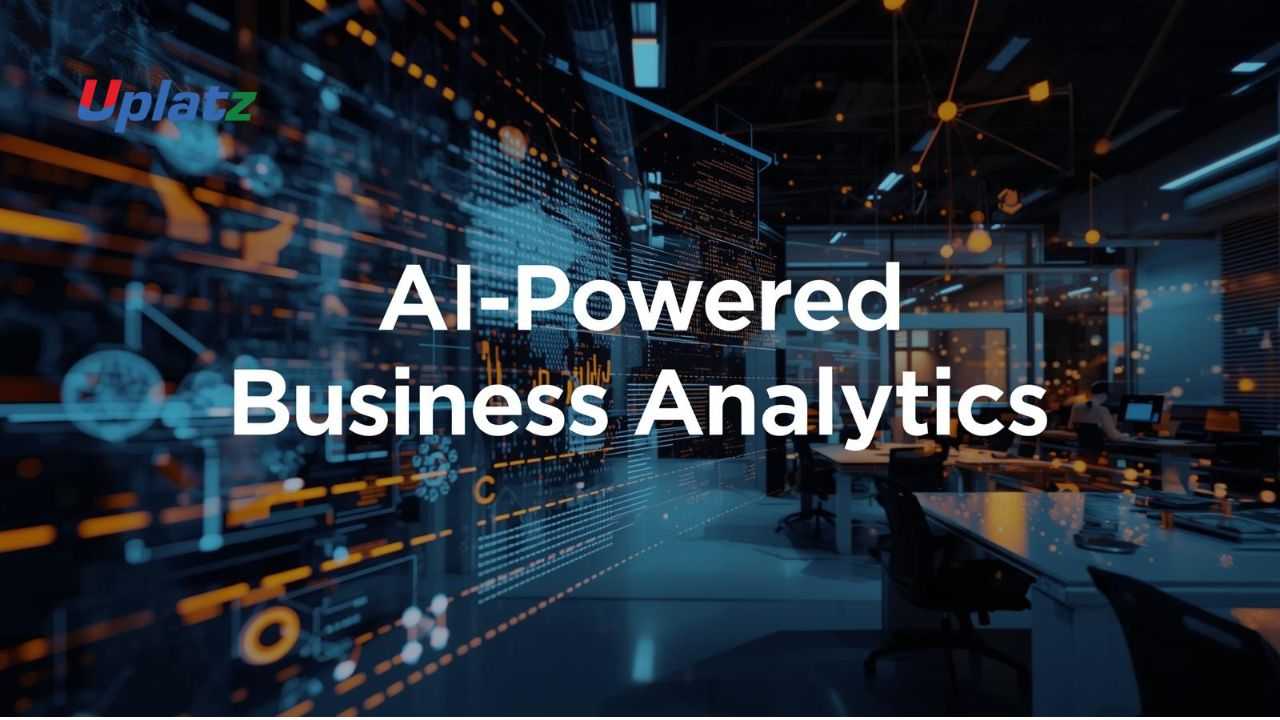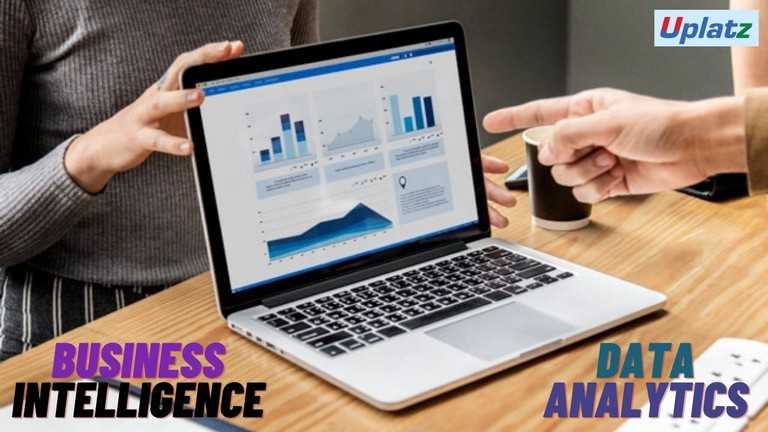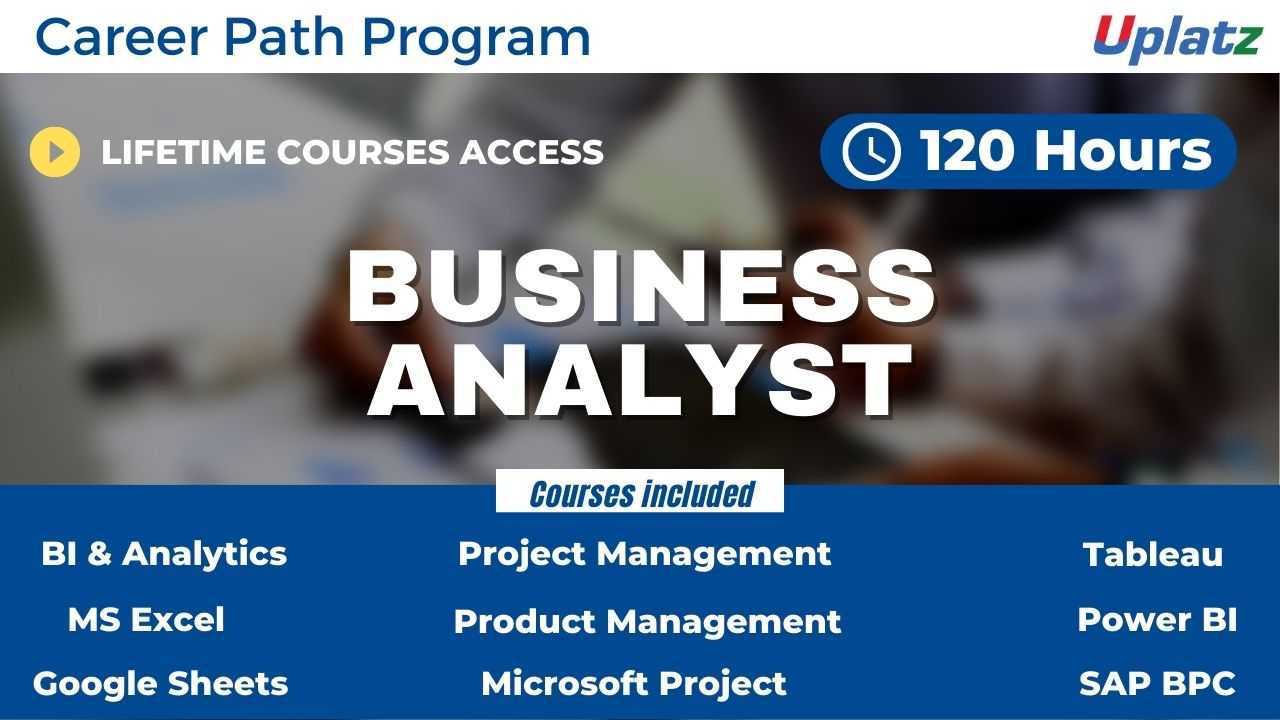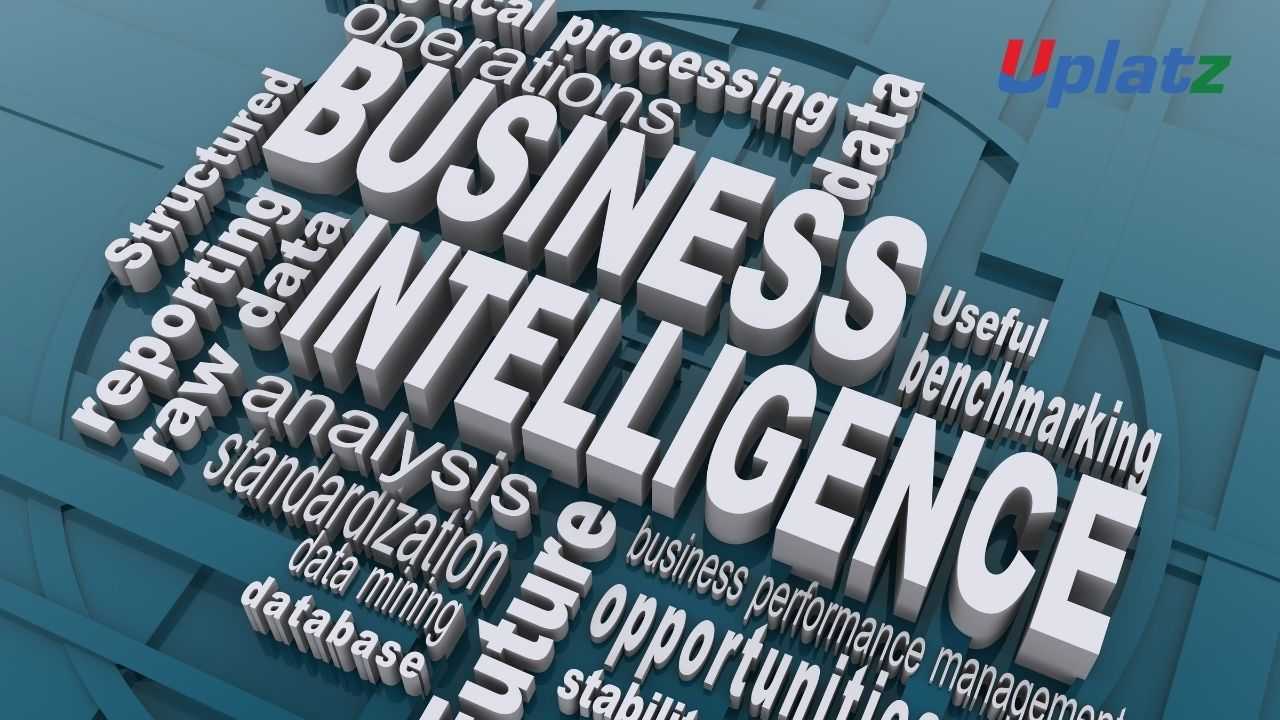AI-Powered Business Analytics
Leverage Artificial Intelligence to uncover insights, automate decisions, and drive data-informed business growth. Price Match Guarantee
Full Lifetime Access
Access on any Device
Technical Support
Secure Checkout
Course Completion Certificate
Price Match Guarantee
Full Lifetime Access
Access on any Device
Technical Support
Secure Checkout
Course Completion Certificate
 90% Started a new career
BUY THIS COURSE (
90% Started a new career
BUY THIS COURSE (GBP 12 GBP 29 )-
 81% Got a pay increase and promotion
81% Got a pay increase and promotion
Students also bought -
-

- Business Intelligence and Data Analytics
- 50 Hours
- GBP 29
- 816 Learners
-

- Career Path - Business Analyst
- 120 Hours
- GBP 99
- 612 Learners
-

- Business Intelligence: Mastering Data-Driven Decision Making
- 10 Hours
- GBP 29
- 10 Learners

AI-Powered Business Analytics is an advanced, hands-on course designed to help professionals harness the power of artificial intelligence to drive strategic, data-driven decisions. It bridges the traditional gap between business intelligence and machine learning, teaching you how to transform raw data into actionable insights that fuel innovation, efficiency, and competitive advantage.
While conventional analytics focuses primarily on understanding what happened and why, AI-powered analytics takes it further — enabling organizations to predict what will happen next and prescribe optimal actions. Through this course, learners will explore how artificial intelligence, machine learning, natural language processing, and automation are revolutionizing business analytics and decision-making.
You will gain practical experience in applying predictive modeling, generative AI, and intelligent automation to real-world business problems. The course combines theory with modern tools, guiding you through building AI-driven dashboards, automating workflows, and developing predictive analytics solutions using platforms like Python, Power BI, Tableau, and AI cloud services.
Whether you are an analyst, data scientist, or business leader, this course empowers you to move from traditional reporting to intelligent, real-time decision systems — transforming data into a strategic business asset.
Why Learn AI-Powered Business Analytics?
The business world is rapidly evolving toward intelligent analytics ecosystems, where data doesn’t just describe the past but also predicts the future. Artificial intelligence is at the core of this transformation, enabling businesses to anticipate trends, optimize operations, and make proactive, evidence-based decisions.
By mastering AI-driven analytics, professionals gain the ability to unlock deeper insights and uncover patterns that would be impossible to detect through manual analysis alone. Instead of static reports and dashboards, AI allows for adaptive systems that learn and improve continuously.
With AI-powered business analytics, you can:
-
Move from descriptive and diagnostic analytics to predictive and prescriptive intelligence.
-
Forecast market trends, customer behaviour, and operational performance.
-
Automate repetitive reporting tasks and generate real-time insights.
-
Leverage AI to detect anomalies, predict risks, and recommend data-driven strategies.
-
Enhance business agility by integrating machine learning into strategic decision-making.
Today, leading organizations such as Amazon, Google, Deloitte, and Microsoft rely on AI-based analytics to drive customer personalization, optimize supply chains, and predict business outcomes. The ability to design, interpret, and deploy such intelligent systems has become one of the most in-demand skills across industries like finance, retail, logistics, and marketing.
As industries adopt data-centric innovation, professionals who understand both business intelligence and artificial intelligence will be uniquely positioned to lead digital transformation initiatives and shape data-driven business strategies.
What You Will Gain
By the end of this course, you will not only understand the principles of AI in analytics but also gain the technical and strategic expertise to design and deploy AI-enabled analytical solutions across industries.
You will learn to:
-
Understand the evolution and role of AI in modern business analytics ecosystems.
-
Apply supervised and unsupervised machine learning models for forecasting, segmentation, and optimization.
-
Automate data preparation, reporting, and visualization using AI-driven tools and cloud platforms.
-
Utilize Natural Language Processing (NLP) and Generative AI for conversational analytics, report automation, and intelligent querying.
-
Develop predictive and prescriptive analytics pipelines that support decision-making in marketing, operations, and finance.
-
Build AI-powered dashboards and self-learning analytics systems that provide continuous, adaptive business intelligence.
This program goes beyond theoretical learning — it emphasizes hands-on, project-based application, helping you bridge concepts with practice and build a portfolio of AI-driven analytical solutions.
Sample projects include:
-
AI-Based Sales Forecasting: Build a predictive model using time-series analysis and machine learning algorithms to forecast revenue and demand.
-
Smart Analytics Dashboard: Design an intelligent dashboard that integrates AI models to deliver predictive insights in real time.
-
Customer Segmentation Model: Implement clustering and classification techniques to identify customer segments and optimize marketing strategies.
-
Automated Reporting System: Use AI and NLP to generate natural language reports and summaries directly from raw datasets.
Through these projects, you’ll gain experience in integrating AI with BI tools, applying predictive models, and communicating complex insights in ways that drive business decisions.
Who This Course Is For
This course is designed for anyone looking to combine business acumen with AI and data science to lead data-driven transformation within their organization.
It is ideal for:
-
Business Analysts & Data Scientists aiming to extend their analytics capabilities with AI and predictive modeling.
-
Business Intelligence (BI) Professionals transitioning from descriptive analytics to AI-driven, real-time intelligence systems.
-
Managers & Decision-Makers seeking to leverage AI for strategic planning, performance optimization, and scenario forecasting.
-
Marketing, Finance, and Operations Analysts who want to automate analysis workflows and uncover actionable insights.
-
Students & Early Professionals aspiring to build careers at the intersection of AI, data, and business strategy.
The course caters to both technical and non-technical learners, offering a balanced blend of conceptual clarity, analytical tools, and strategic frameworks. Whether you’re developing your first predictive model or designing enterprise-wide AI dashboards, you’ll gain the skills to convert complex data into meaningful intelligence.
Transforming Data into Strategy
AI-Powered Business Analytics represents a paradigm shift in how organizations think about data — not just as a reporting tool but as an engine for innovation and foresight. By integrating AI into analytics, businesses can forecast outcomes, detect risks early, personalize experiences, and automate decision-making with unprecedented precision.
This course equips you to lead that transformation. You’ll learn to combine machine learning algorithms, data visualization, and business intelligence frameworks to create intelligent systems that think, adapt, and guide strategic decisions autonomously.
In a world where every enterprise seeks to become data-driven, this course prepares you to move from data interpretation to data innovation — enabling you to design, implement, and scale AI-enabled analytics solutions that redefine how organizations understand and act on information.
By the end of this course, learners will be able to:
- Understand the role of AI in modern business analytics and decision-making.
- Apply machine learning techniques for predictive and prescriptive analytics.
- Automate data collection, transformation, and visualization workflows.
- Implement AI models for trend forecasting and optimization.
- Use natural language processing (NLP) for business text analysis.
- Develop AI-driven dashboards using platforms like Power BI, Tableau, or Looker.
- Integrate AI insights into strategic business planning.
- Ensure data quality, governance, and ethical AI analytics.
- Evaluate model performance using appropriate business KPIs.
- Communicate AI-driven insights effectively to business stakeholders.
Course Syllabus
Module 1: Introduction to AI and Business Analytics
Understanding the convergence of AI and analytics in modern enterprises.
Module 2: The Evolution of Business Intelligence to AI Analytics
From descriptive dashboards to predictive and prescriptive intelligence.
Module 3: Machine Learning Fundamentals for Business
Regression, classification, clustering, and ensemble methods applied to business use cases.
Module 4: Predictive and Prescriptive Analytics
Forecasting future trends and optimizing business strategies using ML algorithms.
Module 5: Natural Language Processing for Business Insights
Text mining, sentiment analysis, and generative AI for business data interpretation.
Module 6: AI-Powered Data Visualization and Dashboards
Building intelligent dashboards with automated insights and anomaly detection.
Module 7: Automating Analytics with AI Tools
Using Power BI, Tableau AI, Google Looker, and DataRobot for automated reporting.
Module 8: Customer and Market Analytics with AI
Segmentation, recommendation systems, and churn prediction for marketing and sales.
Module 9: Financial and Operational Analytics
AI-driven forecasting for budgeting, supply chain, and risk management.
Module 10: Ethical and Responsible AI in Business Analytics
Bias, transparency, accountability, and governance in AI analytics pipelines.
Module 11: Deploying AI Models in Business Environments
Integrating AI into data pipelines and enterprise systems.
Module 12: Capstone Project – AI-Driven Business Intelligence Solution
Develop and present a complete AI-powered analytics project for a business scenario (e.g., sales forecasting, customer retention, or operational efficiency).
Upon successful completion, learners will receive a Certificate of Mastery in AI-Powered Business Analytics from Upaltz.
This certification validates your ability to integrate artificial intelligence into business decision-making, automate analytics workflows, and generate strategic value through data intelligence. It demonstrates your expertise in:
- Applying machine learning and AI tools for predictive analytics.
- Designing intelligent dashboards and business reporting systems.
- Translating AI insights into actionable business strategies.
This credential confirms your readiness to lead AI analytics initiatives in corporate, consulting, and enterprise environments, positioning you at the forefront of the data-driven business revolution.
Proficiency in AI-powered analytics opens opportunities in data and business strategy roles such as:
- AI Business Analyst
- Data Analytics Manager
- Business Intelligence (BI) Developer
- Machine Learning Analyst
- Predictive Analytics Consultant
- AI Strategy & Insights Specialist
These roles are in high demand across industries like finance, retail, healthcare, and consulting — where data-driven intelligence fuels innovation and competitive advantage.
- What is AI-powered business analytics?
It combines AI and machine learning with business intelligence to automate insights, predictions, and decisions. - How does AI differ from traditional analytics?
AI provides predictive and prescriptive insights, while traditional analytics focuses on historical analysis. - What machine learning models are commonly used in business analytics?
Linear regression, random forests, gradient boosting, clustering, and neural networks. - What is predictive analytics?
The use of data and ML models to forecast future outcomes or trends. - What is prescriptive analytics?
Analytics that not only predicts outcomes but also recommends optimal actions. - How can NLP be applied in business analytics?
For sentiment analysis, feedback summarization, report generation, and chatbot interfaces. - What are some AI-powered analytics tools?
Tableau AI, Microsoft Power BI, Google Looker, IBM Cognos, and DataRobot. - What are the ethical concerns in AI analytics?
Bias, transparency, data privacy, and explainability of AI models. - What are examples of AI use cases in business analytics?
Customer churn prediction, demand forecasting, fraud detection, and dynamic pricing. - What metrics are used to evaluate AI analytics success?
Accuracy, precision, recall, ROI, business KPIs, and adoption rate of AI insights.









